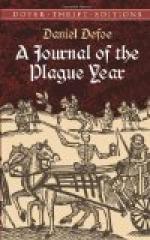[259] “Pretty many,” i.e., a fair number of.
[260] The officers.
[261] Were.
[262] “Falls to the serious part,” i.e., begins to discourse on serious matters.
[263] See note, p. 28. The Mohammedans are fatalists. {Transcriber’s note: The reference is to footnote 28.}
[264] A growth of osseous tissue uniting the extremities of fractured bones.
[265] Disclosed.
[266] The officers.
[267] Leading principle.
[268] Defoe means, “can burn only a few houses.” In the next line he again misplaces “only.”
[269] Put to confusion.
[270] Left out of consideration.
[271] The distemper.
[272] A means for discovering whether the person were infected or not.
[273] Defoe’s ignorance of microscopes was not shared by Robert Hooke, whose Micrographia (published in 1664) records numerous discoveries made with that instrument.
[274] Roup is a kind of chicken’s catarrh.
[275] Them, i.e., such experiments.
[276] From the Latin quadraginta ("forty").
[277] From the Latin sexaginta ("sixty").
[278] Kinds, species.
[279] Old age.
[280] Abscesses.
[281] Himself.
[282] The essential oils of lavender, cloves, and camphor, added to acetic acid.
[283] In chemistry, balsams are vegetable juices consisting of resins mixed with gums or volatile oils.
[284] Supply “they declined coming to public worship.”
[285] This condition of affairs.
[286] Collar.
[287] Economy.
[288] Supply “they were.”
[289] Action (obsolete in this sense). See this word as used in 2 Henry IV., act iv. sc. 4.
[290] Which.
[291] Sailors’ slang for “Archipelagoes.”
[292] An important city in Asia Minor.
[293] A city in northern Syria, better known as Iskanderoon or Alexandretta. The town was named in honor of Alexander the Great, the Turkish form of Alexander being Iskander.
[294] Though called a kingdom, Algarve was nothing but a province of Portugal. It is known now as Faro.
[295] The natives of Flanders, a mediaeval countship now divided among Holland, Belgium, and France.
[296] Colonies. In the reign of Charles II., the English colonies were governed by a committee (of the Privy Council) known as the “Council of Plantations.”
[297] The east side.
[298] On the west side.
[299] See map of England for all these places. Feversham is in Kent, forty-five miles southeast of London; Margate is on the Isle of Thanet, eighty miles southeast.
[300] Commission merchants.
[301] Privateers. Capers is a Dutch word.
[302] Supply “he.”
[303] Supply “the coals.”




